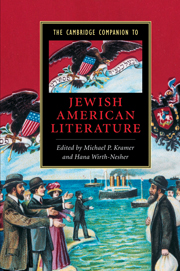Book contents
- Frontmatter
- Introduction: Jewish American literatures in the making
- 1 Beginnings and ends: the origins of Jewish American literary history
- 2 Imagining Judaism in America
- 3 Of crucibles and grandfathers: the East European immigrants
- 4 Coney Island, USA: America in the Yiddish literary imagination
- 5 Hebrew literature in America
- 6 Traces of the past: multilingual Jewish American writing
- 7 Accents of the future: Jewish American popular culture
- 8 Jewish American poetry
- 9 Jewish American writers on the Left
- 10 Jewish American renaissance
- 11 The Holocaust in the Jewish American literary imagination
- 12 Jewish American women writers and the race question
- 13 On contemporary literary theory and Jewish American poetics
- 14 Identity matters: contemporary Jewish American writing
- Index
- Series List
12 - Jewish American women writers and the race question
Published online by Cambridge University Press: 28 May 2006
- Frontmatter
- Introduction: Jewish American literatures in the making
- 1 Beginnings and ends: the origins of Jewish American literary history
- 2 Imagining Judaism in America
- 3 Of crucibles and grandfathers: the East European immigrants
- 4 Coney Island, USA: America in the Yiddish literary imagination
- 5 Hebrew literature in America
- 6 Traces of the past: multilingual Jewish American writing
- 7 Accents of the future: Jewish American popular culture
- 8 Jewish American poetry
- 9 Jewish American writers on the Left
- 10 Jewish American renaissance
- 11 The Holocaust in the Jewish American literary imagination
- 12 Jewish American women writers and the race question
- 13 On contemporary literary theory and Jewish American poetics
- 14 Identity matters: contemporary Jewish American writing
- Index
- Series List
Summary
Practically each word in the title of this chapter has been challenged by thinkers who would mark its fictitious stamp by placing it in quotation marks. Cynthia Ozick is not alone in rejecting the category of “Jewish writer” on the grounds that there is “no Jewish literature,” only writing “on Jewish themes” (Klingenstein, “In Life I Am Not Free,” 49). Given the contradiction between a Nazi propensity to essentialize Jewish traits so as to eradicate the Jewish people and the permeability of Jewish identity, Ozick's proviso remains an important one. Actually, though, the term “Jewish” remains more porous than the words “American” and “women.” For a majority of readers would probably agree that Gertrude Stein, Dorothy Parker, Denise Levertov, Adrienne Rich, Mary Gordon, and Jorie Graham are American women artists (although exactly who Americans are and what constitutes womanhood has certainly been disputed); however, do these authors' Jewish-born relatives make them Jewish American women writers, if (as in these cases) such progenitors alienated themselves from their families, converted, or promoted assimilation in their offspring? Perhaps, as Ozick suggests, the crucial factor that must influence any response to such an inquiry is the extent to which each author concentrates her creative energies on Jewish familial, psychological, ethical, historical, or spiritual issues in her work. Yet the secondariness of women in Judaism – whether it is defined in terms of religious practices or beliefs, Yiddish or Hebrew cultures, Zionism, a commitment to the book or to social justice, ethnic jokes – has transformed Judaism from a background or a theme to a question for women artists. “I've been a problem within a problem,” Adrienne Rich has explained, “'the Jewish Question,' 'the Woman Question' – who the questioner? Who is supposed to answer?” (What Is Found There, 23).
- Type
- Chapter
- Information
- The Cambridge Companion to Jewish American Literature , pp. 231 - 249Publisher: Cambridge University PressPrint publication year: 2003



